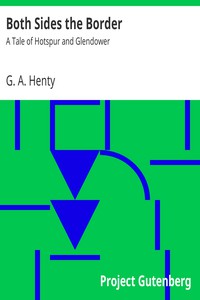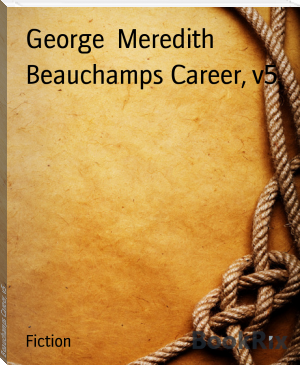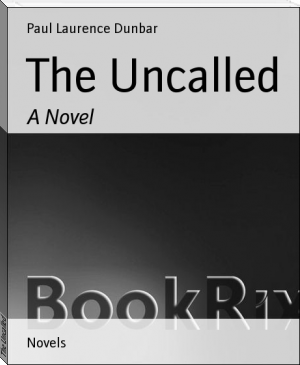Both Sides the Border: A Tale of Hotspur and Glendower by G. A. Henty (literature books to read .txt) 📗

- Author: G. A. Henty
Book online «Both Sides the Border: A Tale of Hotspur and Glendower by G. A. Henty (literature books to read .txt) 📗». Author G. A. Henty
This was said to Oswald, to whom Sir Edmund had taken a strong liking, and to whom he spoke more freely than he might have done to his own knights and officers, as being in Earl Percy's service, and having no personal interest in the matters in debate.
"You yourself have heard the tales that have been brought in to me, showing how greatly the people have been stirred by the belief in Glendower's powers of necromancy; how blue flames have been seen to issue from every window and loophole of his house; how red clouds, of various strange shapes, hover over it; and mysterious sounds are heard throughout the night. For myself, I believe not these tales, though I would not take upon myself to say they are false, since everyone knows that there are men who have dealings with the powers of darkness. Still, I should have, myself, to see these things, before I gave credence to them. That, however, makes no difference in the matter; true or not, they seem to be believed by the Welsh, and cannot but increase his power.
"Well, we shall soon hear what reply he makes to the proclamation, of which he will certainly hear, within a few hours of its posting."
The answer, indeed, was not long in coming; for, within a week, a copy of the reply sent by Glendower to the king appeared, side by side with every proclamation put up, none knowing who were daring enough to affix them. In this, Glendower no longer spoke of his grievance against Lord Grey; but declared that, with the will of the people, he had assumed the sovereignty of Wales, to which he was legally entitled, by his descent from her kings. He called upon every Welshman in England to resort, at once, to his standard.
"The die is cast, now," Sir Edmund said, as he read the paper affixed to the castle gate. "It is no longer a question whether Glendower is wrongfully treated by Lord Grey; it is a matter touching the safety of the realm, and the honour of our lord the king. There is, I have now learned, some foundation for Owen's claim to be the representative of the kings of Wales, through his mother, Elinor. She was the eldest daughter of Elinor the Red, who was daughter and heiress of Catharine, one of the daughters of Llewellyn, the last Prince of Wales. For aught I know, there may be others who have a better claim than he; but at least he has royal blood in his veins.
"At present, that matters little. He has usurped the title of King of Wales, and is evidently a most ambitious and dangerous fellow; and none can doubt that this scheme has not just sprung from his brain, but has long been prepared, and that his quarrel with Lord Grey has but hastened the outbreak.
"I shall myself ride to Ruthyn, and consult with Lord Grey as to the measures to be taken. It may be that our forces may be sufficient to crush the movement, ere it gains strength; though I greatly doubt it. Still, it would be well that we should act in concert.
"Sir John Burgon and Sir Philip Haverstone, do you take half a dozen men-at-arms, and ride through the country, bidding all the tenants assemble here, next Saturday, in their arms and harness, that I myself may inspect them. You may tell them that a third of their number must be in readiness tonight, and must ride hither by morning. The others must, on an alarm being given, gather in strong houses, selected by themselves as the most defensible in their district, with their wives and families, so as to repel any attack the Welsh may make; leaving behind them the boys and old men, to drive out their flocks and herds, either towards the nearest castle, or to Hereford or Shrewsbury, as may be nearest to them."
When the knights had left, messengers were sent out to all the owners of castles in Radnor, Hereford, and Shropshire; bidding them assemble, in four days' time, at Ludlow. On the day of the meeting, nearly three hundred tenants and vassals presented themselves. To them Sir Edmund, having first inspected them and their arms, explained the situation. Then, each man was asked how many he could bring into the field, in accordance with the terms of his holding, and it was found the total amounted to nigh eight hundred men.
"I know not when the affair is likely to begin; and will, therefore, call only for a quarter of your force. Send your sons and unmarried men. At the end of a month they can return to you and, if needs be, you can send as many more in their places. It may be that I shall not require these; but, possibly, every man may have to come out; but you must bear in mind it is not for the defence of this town and castle that men are required, for the garrison and burghers can hold out against any attack, but to save your homesteads from destruction."
The news had created a deep sensation. Although none of those present had experienced the horrors of border warfare, there was not one but had heard, from their fathers, tales of burning, massacre, and wholesale destruction by the Welsh forays. But so long a time had passed, since the last serious insurrection, that the news that Wales might shortly be in arms, again, came as a terrible blow to them. All agreed to send in their proportion of men, at once, and to see that the rest were all ready to assemble, immediately the summons came.
The next day some forty knights, owners of the castles thickly scattered through the border counties, assembled in Ludlow Castle. There was a long consultation. Arrangements were made for the despatch of messengers, by those nearest to the frontier, with news of any Welsh raid. Points were fixed upon where each should assemble, with what force he could gather; thence to march to any threatened place, or to assemble at Ludlow Castle, Mortimer being the warden of the marches along that line of the border.
On the following day Sir Edmund rode, with two of his knights, to hold council with Lord Grey, at Ruthyn. The distance was considerable, and he was absent six days from his castle. Before he returned, an event happened that showed Glendower was in earnest, and intended to maintain his pretensions by the sword.
At daybreak, on the third day after Mortimer had left, a messenger arrived at the castle; with news that a large body of Welsh had, the evening before, entered Radnor by the road across the hills from Llanidloes, and were marching towards Knighton, burning the villages as they went, and slaying all who fell into their hands.
The horn was at once sounded, and Sir John Wyncliffe and the other knights hastily assembled in the courtyard. Here, after a short consultation, it was determined that a mounted party should be, at once, despatched to endeavour to harass the advance of the Welsh; the troop consisting of Alwyn's men-at-arms, twenty men of the garrison, and fifty mounted men who formed part of the new levy. Four hundred footmen were to follow, at once.
Sir John Wyncliffe at first thought of taking the command himself, but it was pointed out to him that his presence would be required, in Ludlow, to marshal the forces that would speedily arrive from all the country round. Sir John Burgon, therefore, a valiant knight, who had greatly distinguished himself against the French, was unanimously chosen by his companions as leader of the whole party; while with him rode Sir Philip Haverstone, and Sir William Bastow.
"This reminds one of one's doings at home, Oswald," his uncle said, as he formed up his little troop. "I trust the Welsh will not retreat, until we have had a taste of their quality; but I doubt much if they will prove as formidable foes as the Scotch borderers."
For a considerable portion of the distance, the roads led through forests, which at that time covered the greater part of the country. Oswald, at the invitation of the knights, rode with them at the head of the cavalcade. The way was beguiled by anecdotes, that had been passed down from mouth to mouth, of the last Welsh war.
They reached Knighton by nine o'clock. The enemy had not, as yet, come within sight of the town; but, throughout the night, the sky to the west had been red with the flames of the burning villages and homesteads.
The male inhabitants were all under arms. Many had already sent their wives and children, in waggons, towards Ludlow; but, as the town had a strong wall, the men were determined upon making a stout defence.
They crowded round the newly arrived troops, with loud cheers; which were raised, again and again, when they heard that, by midday, four hundred footmen would arrive to their assistance. It had been arranged that Sir Philip Haverstone should remain in the town, to take charge of the defence; and that the mounted men should, under Sir John Burgon, endeavour to check the Welsh plundering parties in the open. Sir William Bastow was to remain, to assist Haverstone in the defence of the town. There was no great fear of this falling; as, before the day was out, four or five thousand men would be assembled at Ludlow, and would be able to march to its relief. These matters being arranged, Sir John Burgon led his little troop out of the town.
The accounts of the Welsh forces were very conflicting, but the balance of opinion was that there were not less than four or five thousand of them. Beyond the fact that they were skirting the hills, and advancing towards Knighton, the terrified fugitives could say nothing, save of their own experiences. It was evident, however, that the Welsh force was not keeping together; but, after crossing the border, had broken up and scattered over the country, burning and slaying. Some of the bands had approached to within five miles of the town; and they might, not improbably, come in contact with fresh bands of the enemy, crossing the hills near the source of the Severn. As soon as they had sallied from the castle, and left the town behind them, Sir John halted his party.
"Now, men," he said, "there is one thing that you should remember--these Welshmen are not to be despised. Doubtless you will be able to ride over them, but do not think that, when you have done so, you have defeated them. They will throw themselves down on the ground, leap up as you pass over them, stab your horses from below, seize your legs and try to drag you from your saddles, leap up on to the crupper behind you, and stab you to the heart. This is what makes them so dangerous a foe to horsemen, and at Crecy they did terrible execution among the French chivalry.
"Therefore be careful, and wary. Spit all you see on the ground, with your lances; and hold your swords ever in readiness, to strike them down as they rise up beside you. Keep in as close order as you can, for thus you will make it more difficult for them to rise from the ground, as you pass over."
He then formed his troop into two lines. In the centre of the front line he placed the twenty men-at-arms from the castle, with fifteen of the tenants on either hand. Oswald's troop formed the centre of the second line, with ten of the tenants on either flank. Another of the knights was in command in this line. They were to ride some fifty paces behind the first, to cut down all who rose to their feet after the first line had passed; and if the resistance were strong, and the first line brought to a stand, they were to ride up and reinforce them.
They had ridden some three miles, when they saw a column of smoke rise, half a mile away. The pace was quickened, and they had gone but a short distance when some panic-stricken men came running down the road.
"How many Welshmen have attacked your village?" Sir John asked.
"Hundreds of them, Sir Knight," one of the men panted out; "at least, so it seemed to me; but indeed, we were this side of the village when they rushed into it; and, seeing that nought could be done to resist them, we fled at once."
When within three hundred yards of the village they entered open ground, and at once formed up in the order the knight had directed. Oswald took his place by the side of his uncle, a couple of lengths in advance of their own troop.
Scarce a word was spoken in the ranks.





Comments (0)